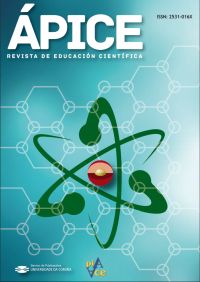Assessment through rubrics of scientific argumentation activities about the consumption of bottled water
Main Article Content
Abstract
The contexts of daily life reinforce the interest to learn in the students while allow to apply the learning outside the classroom. In this paper, a proposal is presented to evaluate the argumentation capacity of students through the use of rubrics. The evaluation activities are part of a training program whose purpose is to transmit certain values and knowledge about the consumption of bottled water, while working on scientific argumentation. Specifically, it shows a scheme of analysis of the difficulty of argumentation activities based on two aspects: the degree of familiarization of students with the scientific content involved in each of them and the origin of the evidence needed to build a scientific argument. Finally, a learning progression is proposed as a hypothesis to improve the capacity for scientific argumentation based on the data obtained with secondary students.
Keywords:
Downloads
Article Details
References
Blanco-López, Á., España-Ramos, E., González-García, F. J., y Franco-Mariscal, A. J. (2015). Key aspects of scientific competence for citizenship: A Delphi study of the expert community in Spain. Journal of Research in Science Teaching, 52(2), 164-198.
Cebrián-Robles, D., Franco-Mariscal, A. J., y Blanco-López, Á. (2018). Preservice Elementary Science Teachers' Argumentation Competence: Impact of a Training Programme. Instructional Science, (Online first), 1-29.
Colucci-Gray, L., Camino, E., Barbiero, G., y Gray, D. (2006). From scientific literacy to sustainability literacy: An ecological framework for education. Science Education, 90(2), 227-252.
España-Ramos, E., y Prieto-Ruz, T. (2010). Problemas socio-científicos y enseñanza-aprendizaje de las ciencias. Investigación en la escuela, (71), 17-24.
Ferrier, C. (2001). Bottled Water: Understanding a Social Phenomenon. AMBIO: A Journal of the Human Environment, 30(2), 118-119.
Gleick, P. H., y Cooley, H. S. (2009). Energy implications of bottled water. Environmental Research Letters: ERL [Web Site], 4(1), 014009.
Henderson, J. B., McNeill, K. L., González-Howard, M., Close, K., y Evans, M. (2018). Key challenges and future directions for educational research on scientific argumentation. Journal of Research in Science Teaching, 55(1), 5-18.
Jiménez-Aleixandre, M. P. (2010). 10 Ideas Clave. Competencias en argumentación y uso de pruebas (Vol. 12). Barcelona: Graó.
Klein, N. (2015). Esto lo cambia todo: el capitalismo contra el clima. Madrid: Paidós.
OECD. (2012). OECD environmental outlook to 2050: the consequences of inaction. Paris: OECD publishing.
Piasentin, F. B., y Roberts, L. (2017). What elements in a sustainability course contribute to paradigm change and action competence? A study at Lincoln University, New Zealand. Environmental Education Research, 24(5), 694-715.
Ratcliffe, M., y Grace, M. (2003). Science education for citizenship: Teaching socio-scientific issues. Maidenhead: McGraw-Hill Education.
Rodríguez-Mora, F., y Blanco-López, Á. (2012). Ideas y creencias de alumnos de educación secundaria sobre la presencia de cal en el agua de bebida. In G. Pinto y M. Martín (Eds.), Enseñanza y divulgación de la química y la física (pp. 197-204). Madrid: Garceta Grupo Editorial.
Rodríguez-Mora, F., y Blanco-López, A. (2015). ¿Por qué bebemos agua embotellada? Una propuesta para la enseñanza de la Física y Química en 3.º de ESO. En A. Blanco y T. Lupión (Eds.), La competencia científica en las aulas. Nueve propuestas didácticas (pp. 205-244). Santiago de Compostela: Andavira editora.
Rodríguez-Mora, F., y Blanco-López, Á. (2016). Diseño y análisis de tareas de evaluación de competencias científicas en una unidad didáctica sobre el consumo de agua embotellada para educación secundaria obligatoria. Revista Eureka sobre Enseñanza y Divulgación de las Ciencias, 13(2), 279-300.
Royte, E. (2008). Bottlemania. How water went on sale and why we bought it. New York: Bloomsbury.
Sanmartí, N., Burgoa, B., y Nuño, T. (2011). ¿Por qué el alumnado tiene dificultad para utilizar sus conocimientos científicos escolares en situaciones cotidianas? Alambique: Didáctica de Las Ciencias Experimentales, (67), 62-69.
Simonneaux, L. (2008). Argumentation in socio-scientific contexts. In S. Erduran (Ed.), Argumentation in science education: perspectives from classroom-based research (pp. 179-199). Dordrecht: Springer.
Siribunnam, S., Nuangchalerm, P., y Jansawang, N. (2014). Socio-Scientific Decision Making in the Science Classroom. Online Submission, 5(4), 1777-1782.
Steffen, W., y Stafford Smith, M. (2013). Planetary boundaries, equity and global sustainability: why wealthy countries could benefit from more equity. Current Opinion in Environmental Sustainability, 5(3), 403-408.
Toulmin, S. E. (1958). The uses of argument (2003rd ed.). Cambridge: Cambridge University Press.



